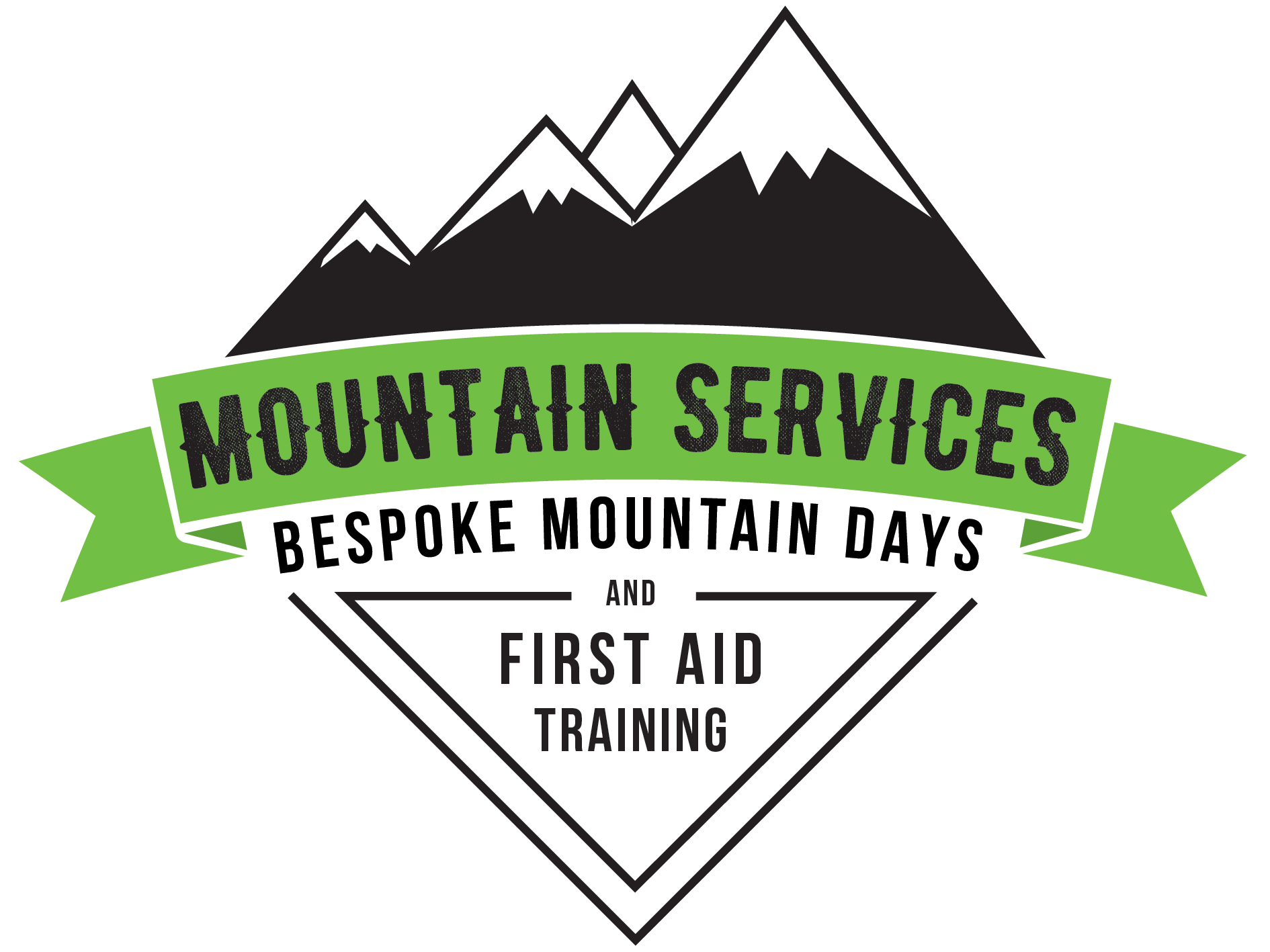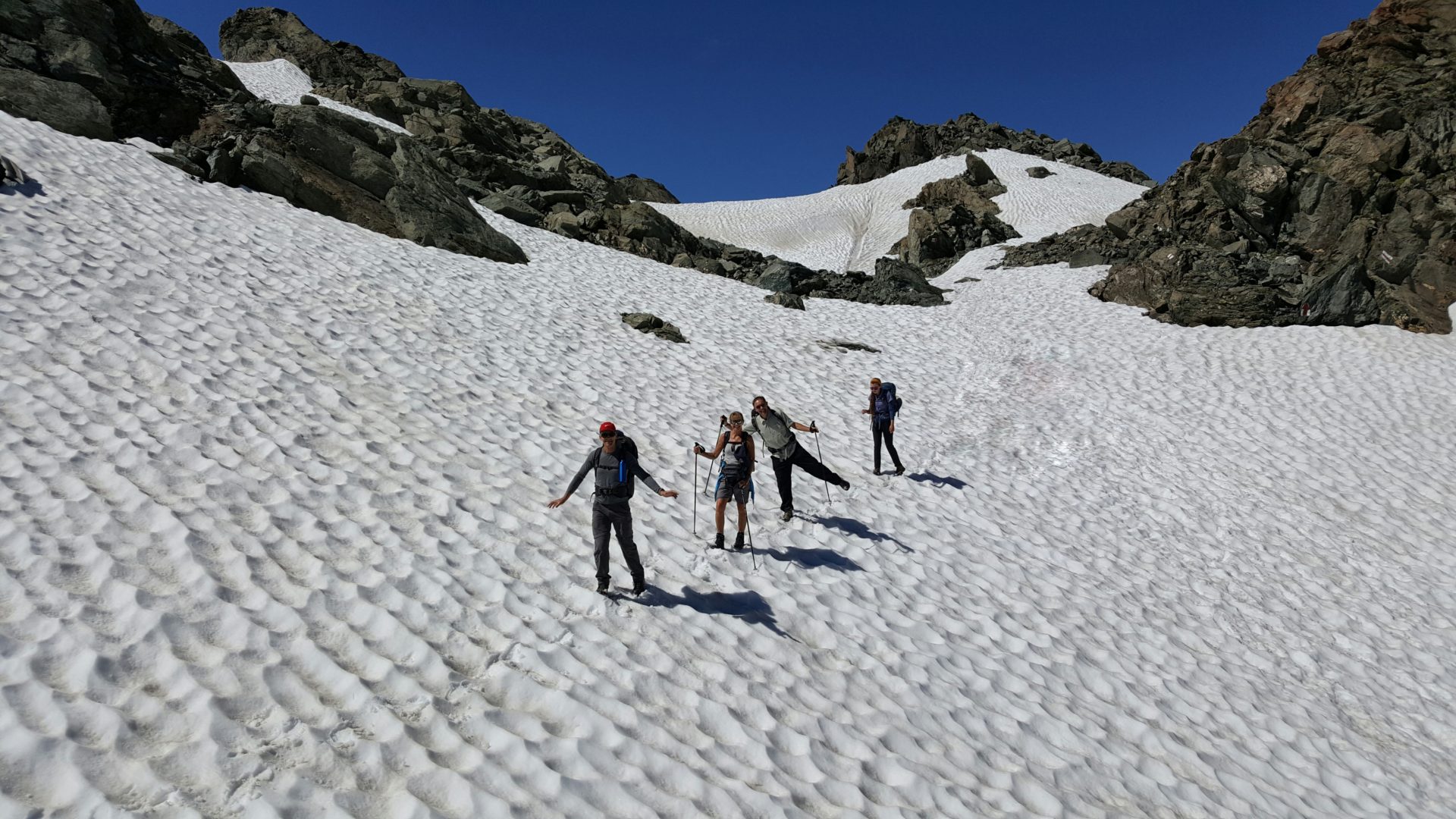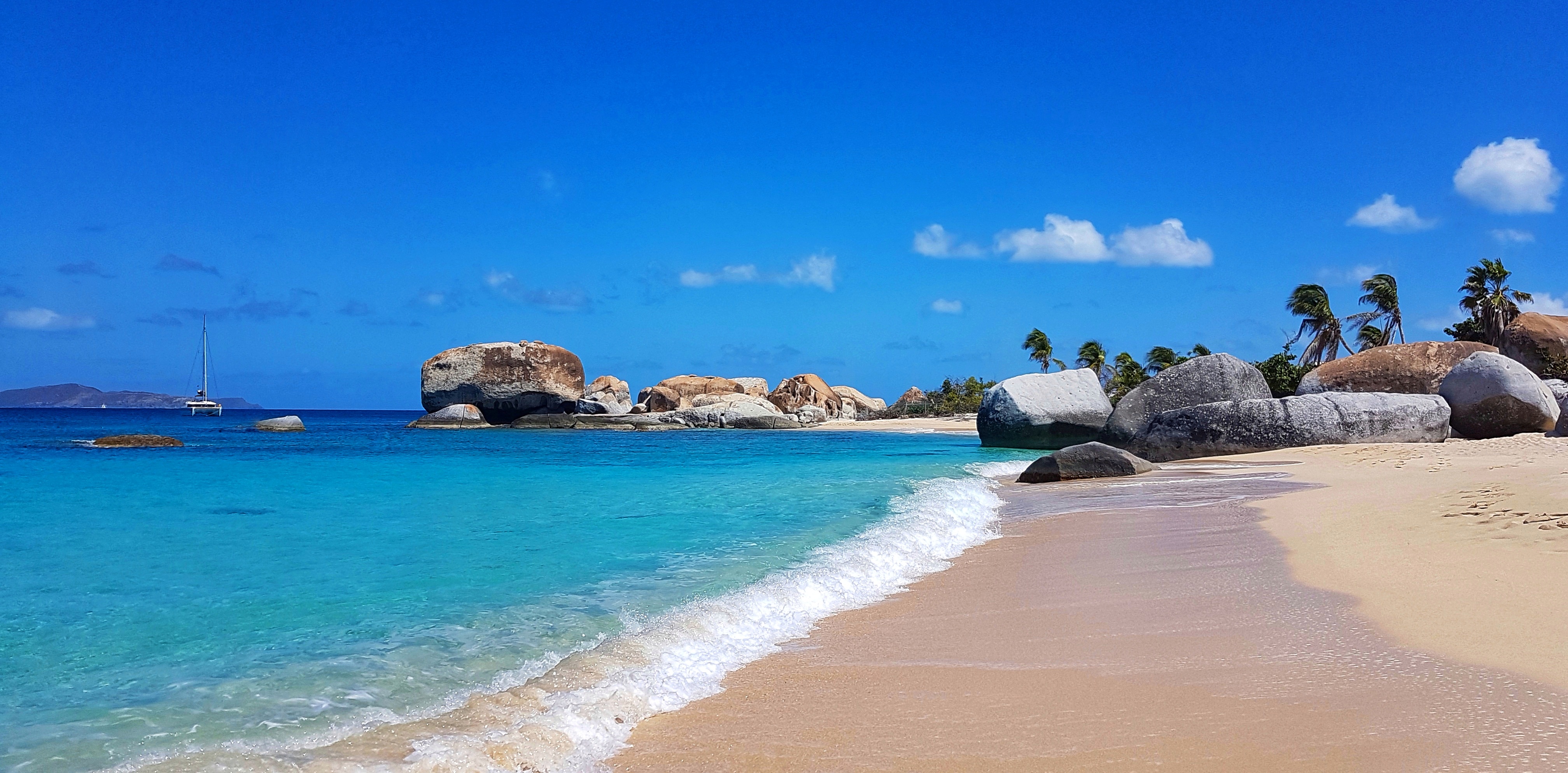Earlier this year I flew out to the Caribbean to deliver Outdoor First Aid courses to Red Cross employees and volunteers. Sounds like a dream job right? Well of course there was a catch – the courses were to be run across the British Virgin Islands – an area devastated by Hurricane Irma in 2017 – and I was flying out mere weeks before the 2018 hurricane season kicked off…
My good friend Pete has been a Red Cross manager for as long as I’ve known him – he attended one of my first Outdoor First Aid courses with his partner with a view to being safer on mountaineering trips – but he kindly went on to say it was one of the best courses he’d ever done, and he’s done a lot. When he touched down in Tortola in the days immediately after Irma and saw the desperate lack of skills in both the local volunteers and the Red Cross staff he immediately started hatching a plan to get me out there to train people. To be honest I was skeptical it would happen, I mean, the red Cross bringing in little ‘ol me to train their people, but slowly and carefully a plan emerged, five courses and a couple of specialist evening sessions for more advanced attendees over 16 days. Psyched.
A BA upgrade to Antigua (note; always travel with medic kitbag) and then a transfer to a little prop where the passengers and the luggage were weighed – coming in to land at Beef Island was magical, from the skies this really does look like paradise. I paid my $10 entrance tax (the only visible tax I
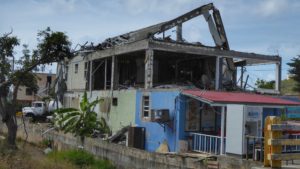
encountered) & then so good to see Pete & Yukari waiting for me. But next we drove through Road Town and I got a quick tour of Tortola Island. Now I’ve been to places that have had much much less, and places far far more remote – but the sheer scale of destruction everywhere was, and still is, hard to put into words. Large boats balance hundreds of feet up hills, tarpualins seems to be the main roofing material. So many cars look like they’ve been thrown and rolled down streets – because they have. Everywhere there were piles of wreckage and debris – yet I’d arrived ten months after the hurricane, hard to comprehend.
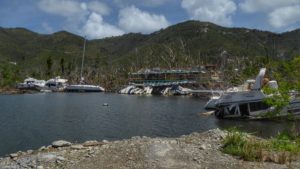 Arriving at the house the Red Cross had hired for volunteers we took a wander out to the local beach. In a theme that was to be repeated throughout my stay it was idyllic – looking out to sea it’s hard to fathom the chaos and devastation that remains everywhere inland.
Arriving at the house the Red Cross had hired for volunteers we took a wander out to the local beach. In a theme that was to be repeated throughout my stay it was idyllic – looking out to sea it’s hard to fathom the chaos and devastation that remains everywhere inland.
My first day at the Red Cross offices was an introduction to, and a very steep learning curve in, a similar but really verydifferent culture. So I’ll address this now; the BVI is a relatively affluent and advanced country – indeed compared to other places I’ve done aid work it was very civilised – but even on that first day it was clear something wasn’t working in the way my European centred mind understood. there’s a lot of emphasis on status – and as a society there’s very little social (or state) wealth. It’s beyond my scope to understand the socio-political ramifications of a tax haven – but here many things we’d expect the state to undertake after an emergency – road repairs, sanitation, organisation – they were visibly missing. Many of the super rich stepped up, buying generators, flying in tradesmen – but many many more people simply didn’t return. I struggled to understand so much wealth abandoned, but if its undeclared, uninsured disposable wealth then it’s often become too much trouble – I suspect much of the wreckage I saw will simply never be reclaimed. And, this is the key social point, this seems to be totally accepted as it is the norm, people need to, and want to, help themselves, because no-one else is going to. Everyone I met and worked with was immensely grateful for my volunteering, for the volunteers of VISAR (Virgin Islands Search And Rescue) and of course the Red Cross.
I for one didn’t realise that the fantastically titled Disaster Relief Teams – people who went out in the teeth of the storm to take food, water and shelter to their communities, the same people who

were the first to enter devastated areas to search for survivors – these people were by and large ordinary folk with no real training – maybe an inadequate first aid kit that they didn’t know how to use, maybe a beat up car. Heroes. And they were all really really keen to learn life saving skills as they’d all seen lives lost.
So in total I taught 65 people, visited 4 islands, caught 4 planes, 4 ferries, 1 incredibly fast VISAR boat and was involved in one car crash…
As an instructor I had to adapt very quickly to a total lack of underlying skills – the few (with the exception of the Search & Rescue Team members) people who had attended courses had ideas I’ve not seen taught in twenty years and more, those that hadn’t been on a course managed to double my entire stock of old wives tales*
The first course was at the Red Cross offices in Road Town. It was quickly clear that DR(s) ABC needed to be fully taught and understood by the participants – for most it was a totally new concept. For some I ran an evening session that addressed catastrophic bleed – but for many of the volunteers that was step to far.
With Pete’s help I adapted my usually hill based training to an urban disaster scene. Having now  seen the ferocious power of the hurricane it was easy to improvise impale injuries, crush injuries and more. Talking to the volunteers about what they’d had to deal with highlighted for me again why Outdoor Emergency First Aid really is so far removed from the classic First Aid at Work setting, why its vital to get an instructor who’s actually “been there, done that”. Moving a casualty from rising flood waters, choosing between possibly paralysed or definitely lost – knowing that help and evacuation may be days away – knowing how to assess, improvise & act, these make the difference between saving lives and sitting waiting for an ambulance.
seen the ferocious power of the hurricane it was easy to improvise impale injuries, crush injuries and more. Talking to the volunteers about what they’d had to deal with highlighted for me again why Outdoor Emergency First Aid really is so far removed from the classic First Aid at Work setting, why its vital to get an instructor who’s actually “been there, done that”. Moving a casualty from rising flood waters, choosing between possibly paralysed or definitely lost – knowing that help and evacuation may be days away – knowing how to assess, improvise & act, these make the difference between saving lives and sitting waiting for an ambulance.

One drill that worked really really well with the volunteers was for them to use the crowd of bystanders – so with their new knowledge of basic DR ABC they could take charge but get people involved – the 30 minute CPR cycle working really well. There a few defibrillators on the Island – two that we found were actually locked away, we calculated that for most folks it would be a minimum of 30 minutes to get one to the scene. By the end of the second day everyone available was given a task – even the those not directly involved were creating shade, result
And talking of results I’ll say now – of those taking the regulated full OFA course 49 passed. Some failed for attendance, and some just didn’t meet the standard (some were physically unable to do cpr on a casualty on the ground). But – everyone grew in confidence and all of them felt they could at least try to help.
Next was Anegada – a coral island only 6m at its highest point – but what a fabulous sense of community. There’s one nurse on the island, and its a 2 hour fast boat ride to the hospital or if you’re lucky a 55 minute flight. When the flotillas of sailing holidays (normally) arrive the population can soar to over a 1000, but just 300 people live there all year. Oh & when the nurse is on holiday or visits another island then there’s no replacement – these people really need to know how to look after themselves. The school is the heart of this remote community – and that’s where
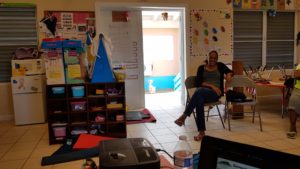
the course took place. Half of the attendees were connected to the school, but here everyone really knows everyone. It was heartbreaking to have them tell me that just a few days before I arrived a young man from the village had died coming off his scooter, help was simply too far away. I added an appropriate level of paediatric content to the course and scenarios at the request of the teachers – shocking to me that they’d no first aid training, a huge relief to them. Unsurprisingly really, this remote island full of people with big hearts had the highest pass rate (90%)
Then to Virgin Gorda – an island of immense disparity – it’s off the coast of here that Richard Branson owns islands – but this island also has an emerging gang culture and some effectively ‘no-go’ areas.
I’ll use VG as an example of some of the things we covered on all the courses and also some of the things that made me pause and ponder;
For these courses I added in quite a bit about the different cpr protocols for drowning (everyone spends a goodly part of their lives here either on, in or near the water), I was genuinely shocked to meet teachers on every course who didn’t have any first aid training, so paediatric protocols were also prominent. Things like poisoning and anaphylaxis were adapted to local issues and drug protocols – I was particularly taken with the Manchineel Tree – its sap burns even when diluted at 10:1, it’s fruit is highly poisonous and if burnt the smoke it gives off is toxic – it’s a beach tree so each year tourists stand under it in the rain or use if for barbecues, horrid. I also made sure to cover tourniquets and ran a couple of specialised catastrophic bleed management workshops. Moving the casualty was a must, not an option. I spent a long time with the Red Cross team working on developing appropriate first aid kits – I estimate we threw out about 60% of most of the kits they’d bought in. We also created inspection logs and standardised procedure – seems simple but makes a huge difference. But the one thing that had the biggest impact was something that remains the same wherever in the world I deliver First Aid – I got people up and doing. If not doing perfectly then at least trying their best. No whispering – SHOUT for help. No moving your hands about – LOOK properly, unzip, look, feel. And my particular hobby horse – CHECK for danger, is the engine off, is the ground stable, has the shark gone (ok I added that last one in to see who’s still reading…)
I also had some of my own habits and practice developed. The requirement to understand your attendees and their needs, wants and limitations is vital. Travelling abroad makes that more obvious, but I’ll question candidates ahead of courses more in future. Courses pitched too high switch people off but the same is also true if it’s too low. I was saddened that employers didn’t get behind the courses more – so we planned 4 of them to run outside working hours, that in turn needs to be managed, a couple of people were physically shattered by the time the course finished.
As ever having an Instructor who can (& does) step away from the powerpoint; who can answer diverse questions and make the process interactive and relevant shone through; a load of pictures of skinny white people in outdoor kit really wasn’t going to make a connection with these participants.
BVI is also a western country with a very obese population demographic. I’m a fit outdoor instructor – but we had one person even I couldn’t put into the recovery position – hence some good learning for me to have that addressed by the next day.
I followed Virgin Gorda with the return trip to Tortola. Somewhere in the middle of it all I shot over to Peter Island with VISAR to run some training scenarios – spinal boards, mobile cpr – getting soaked as the boat bounced – knowing what each person in a team was doing, trusting them to do it – and keeping an eye on the sea for debris still floating around…On my solitary day off I went for a ride along on an off road driving course for the Red Cross. Knowing I could trust the instructor (yep it was Pete)

I was snoozing in the bouncing back, looking forward to swimming with lobsters and barracudas – when Pete drove off a cliff. There’s simply no other way to describe the road down to Lava Flows Bay, as a climber I’d give it a Grade 3. At the bottom we found the wrecked car of the only other people to attempt to get there that day – tyres torn out. The swimming was wonderful, but on the return it was the trainees turn – lets just say it didn’t go well…when Pete got out to check just how badly stuck in the ditch we were he slipped on the moving ground and gouged his head on the (missing) sparewheel bolts. A little blood was very quickly a lot of blood – Emergency First Aid time! we managed to reduce the flow massively, flag down some passersby on the top road and get Pete to hospital in double quick time. 8 stitches and a minor arterial bleed stopped, some day off.
But – remember those non-standardised not checked first aid kits from earlier? I’m ashamed to say on a day off I’d not checked the Landrover had been updated, we lost minutes in treating Pete as we rummaged and improvised – minutes that could have been vital. Lesson learnt.
All too soon it was time to have one last celebratory dinner, a wonderful affair cooked by a lovely Tamil Red Cross worker – then a wander to the beach for one last sunset. It was a whirlwind of an experience, but one I’m very grateful for.
Taking off it was a wrench to leave – I can see why all the locals say “you’ll be back”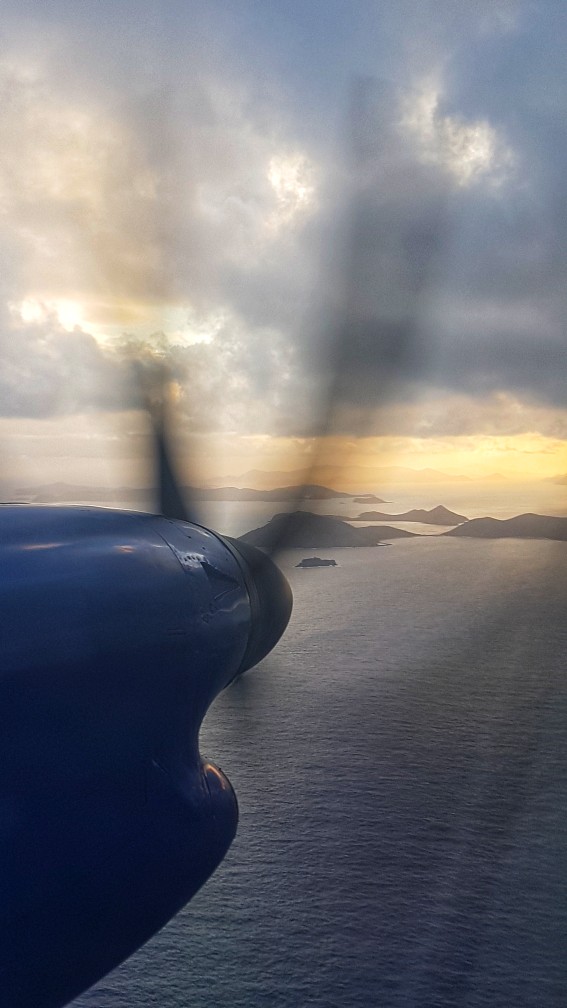
For most of the long journey home I ruminated on the dilemma I felt at doing aid work (the British red Cross BVI flew me out, hosted me and picked up direct costs, but I gave my time) in a developed country. The culture shock was far greater than in many places I’ve traveled – as it seemed like these people could and should have done more collectively – but that simply isn’t how BVI works. 85% of course participants were female. Your surname really does infer status. People either drove brand new cars or cars that should be condemned (one in VG had a passenger seat that wasn’t attached and a roof made of bin bags). People I spoke with know that repairs have been inadequate, that there shouldn’t be piles of dangerous waste on every street corner – that some harbours and bays may simply be abandoned due to sunken waste. On a societal level much felt wrong. But, always a but. The people I met all wanted and needed the help we brought. On a human level we left 65 more potential lifesaving heroes behind. That’s got to be a good thing.
So BVI First Aid myths:
- Black pepper (or chillis) do not cure heart attacks
- Tourniquets do not cause epilepsy
- Flour or sand should not be used to pack wounds
- A fast bumpy car ride will not simulate cpr
